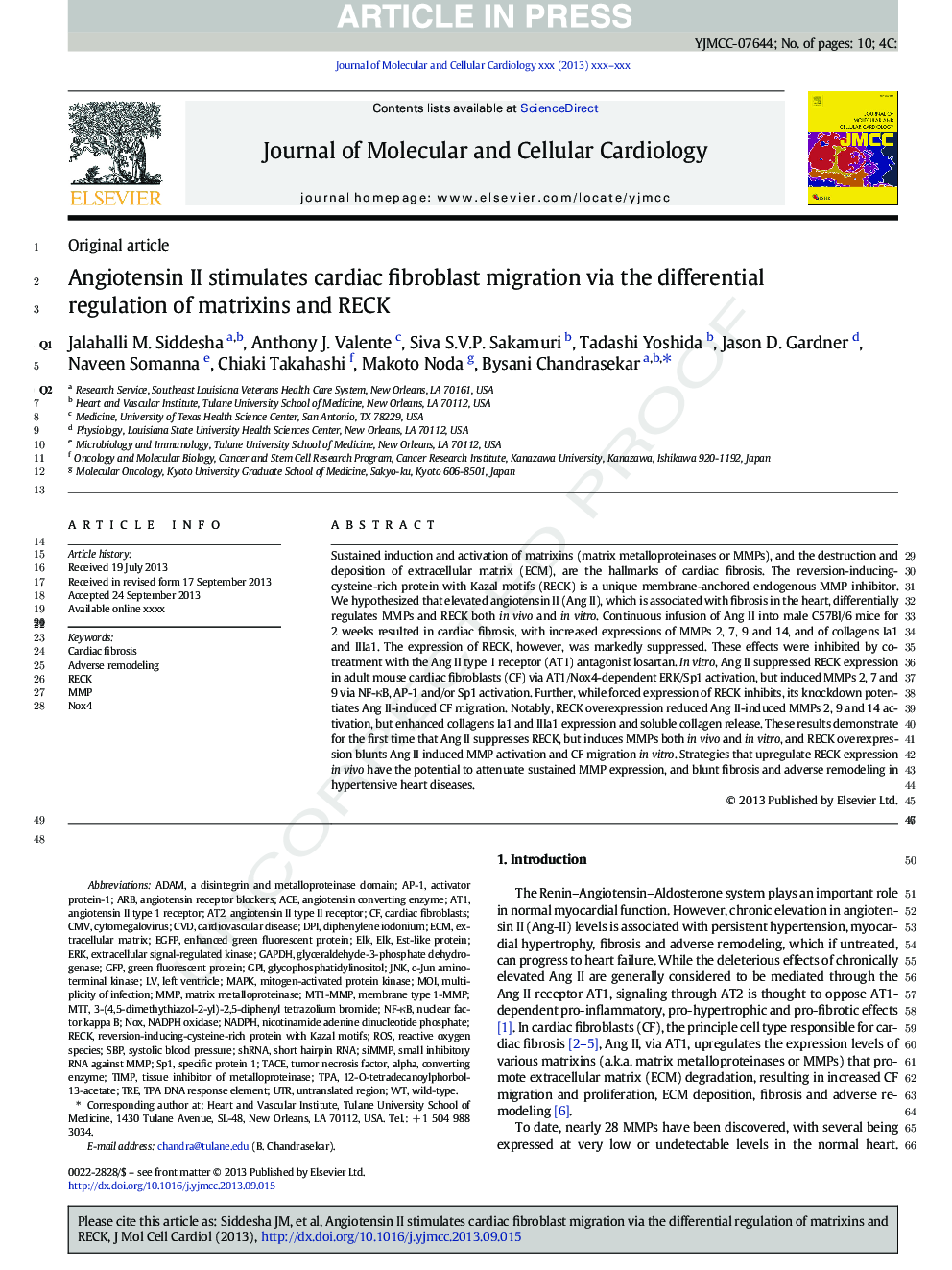| Article ID | Journal | Published Year | Pages | File Type |
|---|---|---|---|---|
| 8474960 | Journal of Molecular and Cellular Cardiology | 2013 | 10 Pages |
Abstract
Sustained induction and activation of matrixins (matrix metalloproteinases or MMPs), and the destruction and deposition of extracellular matrix (ECM), are the hallmarks of cardiac fibrosis. The reversion-inducing-cysteine-rich protein with Kazal motifs (RECK) is a unique membrane-anchored endogenous MMP regulator. We hypothesized that elevated angiotensin II (Ang II), which is associated with fibrosis in the heart, differentially regulates MMPs and RECK both in vivo and in vitro. Continuous infusion of Ang II into male C57Bl/6 mice for 2 weeks resulted in cardiac fibrosis, with increased expressions of MMPs 2, 7, 9 and 14, and of collagens Ia1 and IIIa1. The expression of RECK, however, was markedly suppressed. These effects were inhibited by co-treatment with the Ang II type 1 receptor (AT1) antagonist losartan. In vitro, Ang II suppressed RECK expression in adult mouse cardiac fibroblasts (CF) via AT1/Nox4-dependent ERK/Sp1 activation, but induced MMPs 2, 14 and 9 via NF-κB, AP-1 and/or Sp1 activation. Further, while forced expression of RECK inhibits, its knockdown potentiates Ang II-induced CF migration. Notably, RECK overexpression reduced Ang II-induced MMPs 2, 9 and 14 activation, but enhanced collagens Ia1 and IIIa1 expression and soluble collagen release. These results demonstrate for the first time that Ang II suppresses RECK, but induces MMPs both in vivo and in vitro, and RECK overexpression blunts Ang II-induced MMP activation and CF migration in vitro. Strategies that upregulate RECK expression in vivo have the potential to attenuate sustained MMP expression, and blunt fibrosis and adverse remodeling in hypertensive heart diseases.
Keywords
ECMGPiAP-1AT1TACEARB12-O-tetradecanoylphorbol-13-acetateERKMT1-MMPGAPDHshRNANADPHtPANOX4eGFPAT2GFPNF-κBMMPDPIJnkc-jun amino-terminal kinaseSBPRECKMAPKMOIMTTNOxshort hairpin RNAROSSp1ADAMangiotensin II type 1 receptorNADPH oxidaseleft ventriclecardiovascular diseaseElkdiphenylene iodoniumCVDTIMPTREcytomegalovirusCMVnuclear factor kappa Bsystolic blood pressurecardiac fibroblastsCardiac fibrosisExtracellular matrixmatrix metalloproteinaseAngiotensin receptor blockersUTR یا untranslated regions untranslated regionTissue inhibitor of metalloproteinasewild-typenicotinamide adenine dinucleotide phosphateSpecific protein 1reversion-inducing-cysteine-rich protein with kazal motifsactivator protein-1green fluorescent proteinenhanced green fluorescent proteinmitogen-activated protein kinasemultiplicity of infectionextracellular signal-regulated kinaseglyceraldehyde-3-phosphate dehydrogenaseglycophosphatidylinositolReactive oxygen species
Related Topics
Life Sciences
Biochemistry, Genetics and Molecular Biology
Cell Biology
Authors
Jalahalli M. Siddesha, Anthony J. Valente, Siva S.V.P. Sakamuri, Tadashi Yoshida, Jason D. Gardner, Naveen Somanna, Chiaki Takahashi, Makoto Noda, Bysani Chandrasekar,
